5 Foods That Heal Your Gut and Beat Bloating
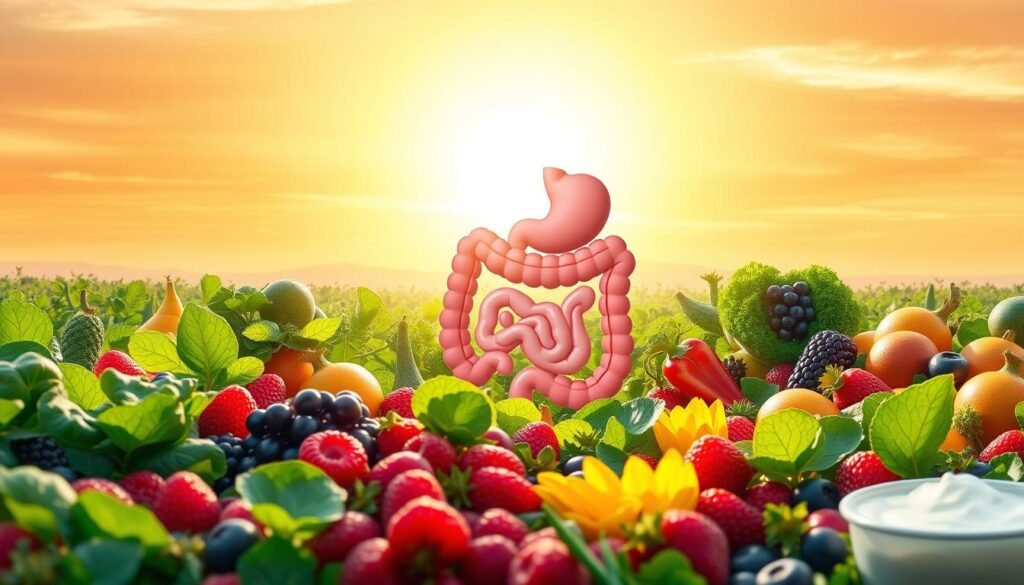
Did you know that nearly 30% of the population suffers from bloating, a symptom often associated with poor gut health? Maintaining a healthy digestive system is crucial for overall well-being, and diet plays a significant role in this.
A well-balanced diet can help regulate bowel movements, prevent fluid retention, and enhance gut health. Certain foods have been shown to have a positive impact on digestive wellness, alleviating symptoms of bloating.
This article will explore specific foods that can help heal your gut and reduce bloating, promoting a healthier you.
Key Takeaways
- Understanding the link between diet and gut health.
- Identifying foods that alleviate bloating.
- Learning how to incorporate these foods into your diet.
- Discovering the benefits of a balanced digestive system.
- Simple dietary changes for long-term relief.
Understanding Gut Health and Bloating
The intricate balance of our gut microbiome plays a significant role in our digestive health, and disruptions to this balance can lead to uncomfortable bloating. A healthy gut is crucial for overall well-being, influencing not just digestion but also our immune system and even mental health.
The Gut Microbiome and Its Importance
The gut microbiome consists of trillions of microorganisms living in our gastrointestinal tract. These microbes are essential for digesting food, absorbing nutrients, and producing certain vitamins. An imbalance, or dysbiosis, can lead to various health issues, including bloating.
Common Causes of Bloating
Bloating is often caused by excess gas, constipation, or sensitivity to certain foods. Swallowing air, eating gas-producing foods, and having an imbalance in the gut microbiome can also contribute to bloating. Understanding these causes is the first step towards finding bloating relief.
- Eating foods that are high in salt or sugar
- Consuming carbonated drinks
- Having food intolerances
The Gut-Brain Connection
The gut and the brain are connected through the gut-brain axis, a bidirectional communication network that influences both digestive health and mental well-being. Stress can affect the gut, leading to bloating and other issues, while a healthy gut can support mental health. This connection highlights the importance of a holistic approach to health, incorporating natural remedies for bloating that also support mental well-being.
By understanding the complex interplay between the gut microbiome, common causes of bloating, and the gut-brain connection, individuals can take the first steps towards achieving better gut health and reducing bloating.
Why Your Diet Matters for Digestive Wellness
What you consume can significantly impact your gut health and overall well-being. A diet rich in the right foods can help alleviate bloating and other digestive issues, while a poor diet can exacerbate these problems.
Inflammatory vs. Anti-inflammatory Foods
Certain foods can either inflame or soothe your digestive system. Anti-inflammatory foods are crucial for maintaining a healthy gut. These include foods high in omega-3 fatty acids, antioxidants, and fiber.
Examples of anti-inflammatory foods include fatty fish like salmon, berries rich in antioxidants, and leafy greens high in fiber. On the other hand, inflammatory foods such as processed meats and foods high in trans fats can worsen digestive health.
The Role of Fiber in Gut Health
Fiber plays a pivotal role in digestive health by promoting regular bowel movements and supporting the growth of beneficial gut bacteria. Foods high in fiber include fruits, vegetables, and whole grains.
A diet rich in fiber can help reduce bloating and improve overall gut health. It’s recommended to consume a variety of fiber-rich foods daily.
How Food Sensitivities Contribute to Bloating
Food sensitivities can lead to bloating and other digestive discomforts. Common culprits include gluten, dairy, and soy. Identifying and avoiding these trigger foods can significantly reduce bloating.
Keeping a food diary can help identify foods that cause sensitivities. Once identified, eliminating these foods can lead to improved digestive health.
| Food Type | Inflammatory Foods | Anti-inflammatory Foods |
|---|---|---|
| Protein Sources | Processed meats | Fatty fish (salmon, sardines) |
| Fats | Trans fats | Omega-3 rich oils |
| Fruits & Vegetables | High-sugar fruits | Berries, leafy greens |
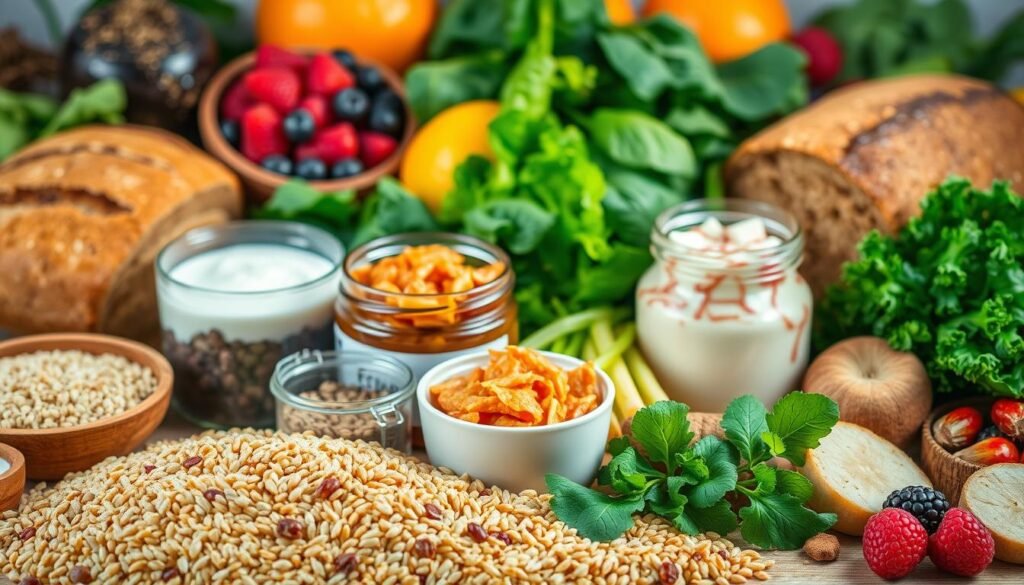
By understanding the impact of diet on digestive wellness, individuals can make informed choices to improve their gut health. Incorporating anti-inflammatory foods, increasing fiber intake, and avoiding food sensitivities are key steps towards achieving better digestive health.
5 Foods That Heal Your Gut and Beat Bloating
When it comes to healing your gut and reducing bloating, the right foods can make all the difference. The foods we eat play a crucial role in shaping our gut health, and certain foods have been shown to have a significant impact on reducing bloating and improving overall digestive wellness.
The Science Behind Food Selection
The selection of these five foods is based on their unique properties that support gut health. Fermented foods, ginger, bone broth, leafy greens, and pineapple have been identified as particularly beneficial due to their anti-inflammatory, probiotic, and digestive enzyme properties.
- Fermented foods contain live cultures that support gut flora.
- Ginger has natural anti-inflammatory properties that can help reduce bloating.
- Bone broth is rich in collagen and amino acids that heal the gut lining.
- Leafy greens are high in fiber, supporting healthy digestion.
- Pineapple contains bromelain, an enzyme that aids digestion.
How These Foods Work Together
These foods work synergistically to create a balanced gut environment. For example, fermented foods and leafy greens support the growth of beneficial gut bacteria, while ginger and pineapple help reduce inflammation and aid digestion. Bone broth, with its rich collagen content, helps to heal and seal the gut lining, reducing the risk of leaky gut syndrome.
Incorporating These Foods Into Your Daily Routine
Incorporating these foods into your diet can be simple and delicious. Here are some tips:
- Start your day with a ginger-infused tea or add fresh ginger to your meals.
- Include a serving of fermented foods like yogurt or sauerkraut with your meals.
- Use bone broth as a base for soups or stews.
- Add leafy greens to your salads or sauté them as a side dish.
- Enjoy pineapple as a snack or add it to your smoothies.
By incorporating these 5 foods that heal your gut and beat bloating into your diet, you can take a significant step towards improving your gut health and reducing bloating.
Food #1: Fermented Foods – Nature’s Probiotic Powerhouse
The power of fermented foods lies in their ability to enhance gut flora, reducing bloating and improving overall digestive health. Fermented foods are rich in probiotics, which are live microorganisms that confer health benefits when consumed in adequate amounts.
Types of Beneficial Fermented Foods
There are numerous types of fermented foods that can be beneficial for gut health. Some of the most popular include:
- Yogurt: Rich in Lactobacillus and Bifidobacterium strains
- Kefir: A fermented milk product with a diverse range of probiotic bacteria
- Sauerkraut: Finely shredded cabbage fermented in its own juice, rich in vitamins and probiotics
- Kimchi: A Korean fermented vegetable dish, typically made with cabbage or radish, that is rich in probiotics and vitamins
- Miso: A fermented soybean paste used in Japanese cuisine, rich in probiotics and antioxidants
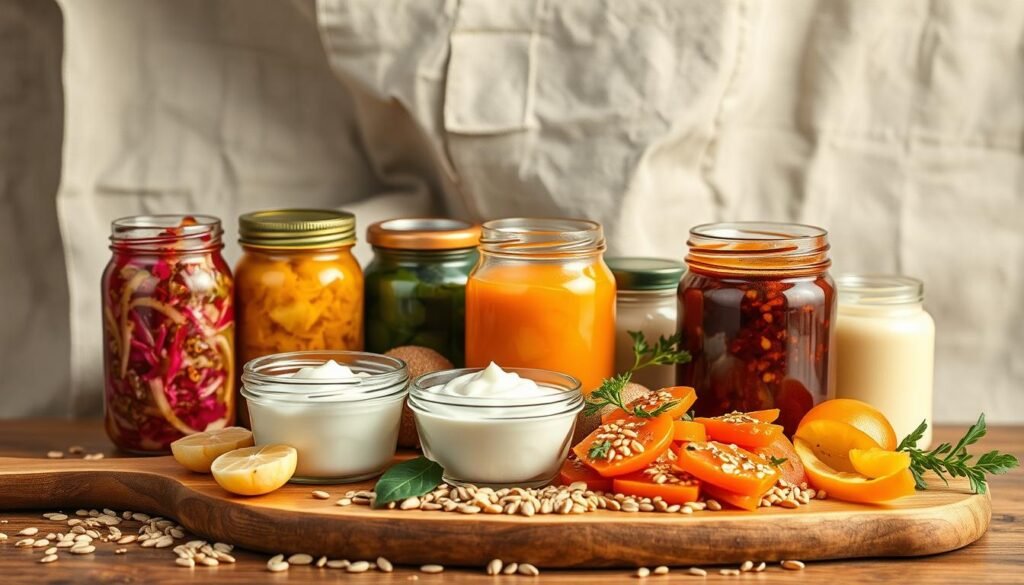
How Fermented Foods Improve Gut Flora
Fermented foods improve gut flora by introducing beneficial bacteria into the digestive system. This can help to:
- Crowd out pathogenic bacteria, reducing inflammation and improving immune function
- Enhance the gut barrier function, reducing permeability and the risk of leaky gut syndrome
- Produce vitamins and hormones that support overall health and well-being
Recommended Daily Intake
To reap the benefits of fermented foods, it’s recommended to consume them regularly. A general guideline is to include 1-2 servings of fermented foods in your daily diet. One serving could be:
| Food | Serving Size |
|---|---|
| Yogurt | 1 cup |
| Sauerkraut | 1/4 cup |
| Kefir | 1 cup |
| Miso | 1 tablespoon |
Incorporating fermented foods into your diet can be simple and delicious. Start by adding one or two servings to your daily meals and observe how your body responds.
Food #2: Ginger – The Ancient Anti-Bloating Remedy
The use of ginger as a natural anti-bloating agent dates back centuries, with its efficacy rooted in its unique composition of active compounds. Ginger has been a long-standing remedy in traditional medicine for various digestive issues.
Active Compounds in Ginger
Ginger owes its medicinal properties to its rich content of bioactive compounds, particularly gingerols and shogaols. These compounds are known for their anti-inflammatory properties and their ability to aid digestion.
Gingerols, found predominantly in fresh ginger, are responsible for its heating effect and contribute significantly to its anti-inflammatory properties. Shogaols, which are more prevalent in dried ginger, have been shown to have even more potent anti-inflammatory effects.
How Ginger Reduces Inflammation and Gas
Ginger’s ability to reduce inflammation and gas can be attributed to its active compounds. These compounds help in reducing inflammation in the digestive tract and alleviating symptoms of bloating.
The anti-inflammatory action of gingerols and shogaols helps in soothing the digestive system, thereby reducing inflammation. Moreover, ginger has been shown to accelerate gastric emptying, which can help reduce symptoms of bloating and discomfort.
Ways to Include Ginger in Your Diet
Incorporating ginger into your diet is relatively straightforward, given its versatility. Here are a few simple ways to enjoy ginger:
- Add fresh ginger to your tea or hot water for a soothing drink.
- Incorporate grated ginger into your cooking, particularly in Asian-inspired dishes.
- Make a ginger infusion by steeping slices of fresh ginger in hot water.
- Use ginger powder as a spice in your meals.
By incorporating ginger into your daily routine, you can harness its anti-bloating benefits and improve your overall digestive health.
Food #3: Bone Broth – Healing for Your Gut Lining
With its rich nutritional profile, bone broth is emerging as a key component in healing and maintaining a healthy gut lining. This traditional food has been consumed for centuries, and its benefits are now being recognized by modern health enthusiasts.
Nutritional Profile of Bone Broth
Bone broth is rich in collagen, proteins, and minerals that are essential for gut health. The slow cooking process involved in making bone broth releases these nutrients, making them easily absorbable by the body.
| Nutrient | Benefit |
|---|---|
| Collagen | Repairs gut lining |
| Amino Acids (Glycine, Proline) | Reduces inflammation |
| Minerals (Calcium, Magnesium) | Supports overall gut health |
How Collagen and Amino Acids Repair the Gut
The collagen in bone broth plays a crucial role in healing the gut lining. It helps to repair and seal the gut, reducing permeability and inflammation. Amino acids like glycine and proline also contribute to this process by reducing inflammation and promoting the health of the gut lining.

Making and Using Bone Broth
Making bone broth at home is straightforward. Simply simmer animal bones (beef, chicken, or fish) in water for an extended period, typically 12-24 hours, to extract the nutrients. You can then use this broth as a base for soups, stews, or consume it on its own.
To incorporate bone broth into your diet, consider the following tips:
- Drink it straight: Enjoy a warm cup of bone broth as a nutritious beverage.
- Use in cooking: Substitute bone broth for regular broth or stock in your recipes.
- Make it a base: Use bone broth as a base for soups and stews.
By incorporating bone broth into your diet, you can take a significant step towards healing and maintaining a healthy gut lining, thereby reducing bloating and improving overall digestive health.
Food #4: Leafy Greens – Fiber for Digestive Health
Rich in fiber and prebiotics, leafy greens are a simple yet effective way to support digestive health. These nutrient-dense foods play a crucial role in maintaining a healthy gut microbiome, which is essential for overall well-being.
Best Varieties for Gut Health
Some of the best leafy greens for gut health include kale, spinach, and collard greens. These varieties are not only rich in fiber but also packed with vitamins and minerals that support overall health. Incorporating a mix of these greens into your diet can provide a broad spectrum of benefits.
Prebiotic Benefits of Leafy Greens
Leafy greens are an excellent source of prebiotics, which are non-digestible fibers that feed the good bacteria in your gut. This helps to promote a healthy balance of gut flora, supporting digestive health and boosting the immune system. The prebiotic benefits of leafy greens can also help to reduce symptoms of bloating and gas.
Cooking Methods That Preserve Nutrients
To maximize the nutritional benefits of leafy greens, it’s essential to cook them using methods that preserve their nutrient content. Steaming is an excellent way to cook leafy greens without losing their vitamins and minerals. Alternatively, sautéing them quickly with a small amount of healthy oil can also help retain their nutritional value.
By incorporating leafy greens into your diet and using appropriate cooking methods, you can significantly enhance your digestive health and overall well-being.
Food #5: Pineapple – Enzymatic Digestion Support
The digestive benefits of pineapple are largely attributed to its high content of bromelain, an enzyme that aids protein digestion. This tropical fruit has been a staple in diets that focus on improving gut health, and for good reason.

Bromelain and Its Digestive Benefits
Bromelain is a mixture of enzymes found in pineapple that plays a crucial role in breaking down proteins into smaller peptides and amino acids. This process not only enhances nutrient absorption but also helps in reducing inflammation in the digestive tract. Studies have shown that bromelain can be particularly beneficial for individuals suffering from digestive disorders.
The effectiveness of bromelain in aiding digestion can be attributed to its ability to work synergistically with other digestive enzymes. By incorporating pineapple into your diet, you can potentially alleviate symptoms of bloating and improve overall gut health.
Anti-inflammatory Properties
Beyond its digestive benefits, bromelain in pineapple has potent anti-inflammatory properties. It has been shown to reduce inflammation in various parts of the body, including the digestive tract. This can be particularly beneficial for individuals with inflammatory bowel diseases.
The anti-inflammatory effects of bromelain are not limited to the digestive system; they can also contribute to overall well-being by reducing systemic inflammation.
Creative Ways to Enjoy Pineapple
Incorporating pineapple into your diet can be both delicious and versatile. Here are a few ideas:
- Add fresh pineapple chunks to your morning oatmeal or yogurt.
- Blend pineapple into a refreshing smoothie with your favorite fruits.
- Grill pineapple slices as a side dish or dessert topping.
- Use pineapple in savory dishes like stir-fries or as a topping for grilled meats.
By incorporating pineapple into your meals, you can not only enjoy its sweet flavor but also benefit from its digestive and anti-inflammatory properties.
Foods to Avoid for Better Gut Health
Identifying and eliminating inflammatory foods is a crucial step towards better digestive wellness. Certain foods can exacerbate bloating and discomfort, hindering your journey to optimal gut health.
Common Inflammatory Foods
Some foods are known to trigger or worsen inflammation in the gut. These include:
- Processed Foods: Often high in unhealthy fats, sugars, and artificial additives that can disrupt gut flora.
- Dairy Products: Especially for those with lactose intolerance or sensitivity to certain dairy proteins.
- High-FODMAP Foods: Fermentable carbohydrates that can cause gas and bloating in sensitive individuals.
- Gluten: A protein found in wheat, barley, and rye that can cause inflammation in those with celiac disease or gluten sensitivity.
Hidden Sources of Gut Irritants
Gut irritants can often be hidden in seemingly harmless foods. Be aware of:
- Artificial Sweeteners: Found in diet foods and drinks, which can alter gut bacteria.
- Processed Meats: Containing preservatives like sulfites that can irritate the gut.
- Certain Vegetables: Like beans and cabbage, which, while healthy, can cause gas in some individuals.
Reading labels carefully and being mindful of food preparation methods can help minimize exposure to these irritants.
Transitioning Away from Problematic Foods
Eliminating inflammatory foods doesn’t have to be overwhelming. Start by:
- Keeping a Food Diary: To track which foods cause discomfort.
- Gradual Elimination: Remove suspected foods one at a time to identify triggers.
- Finding Alternatives: Replace problematic foods with gut-friendly options.
By being mindful of the foods you avoid and incorporating gut-healing foods, you can significantly improve your digestive health and overall well-being.
Conclusion: Creating Your Gut-Healing Meal Plan
By incorporating the five foods highlighted in this article into your diet and avoiding inflammatory foods, you can create a gut healing diet that supports digestive wellness and reduces bloating. The key is to focus on meal planning for gut health by including fermented foods, ginger, bone broth, leafy greens, and pineapple in your daily routine.
A well-planned gut-healing meal plan can help restore balance to your gut microbiome, leading to improved overall health. Start by introducing these beneficial foods into your meals and gradually adjust your diet to achieve optimal digestive wellness.
With a little planning, you can enjoy a healthier gut and a happier you. Begin your journey to a more balanced digestive system today by creating a personalized meal plan that suits your needs and preferences.
FAQ
What is the gut microbiome, and why is it important for overall health?
How do fermented foods improve gut health?
Can ginger really help reduce bloating?
What makes bone broth beneficial for gut health?
How do leafy greens support digestive health?
What is bromelain, and how does it aid digestion?
What are some common inflammatory foods that can worsen bloating?
How can I start incorporating these gut-healing foods into my diet?
Are there any tips for transitioning away from inflammatory foods?
🌸 Discover Weight Management Supplements That Works — Handpicked for You
Curated health & beauty essentials our readers trust — explore your new self-care favorites.
🌸 Discover Beauty That Works — Handpicked for You
Curated health & beauty essentials our readers trust — explore your new self-care favorites.
💖 Connect with SmartWellnessBeauty
Join our wellness & beauty community for daily inspiration, mindful living, and radiant self-care — follow us across your favorite platforms.
Explore More ✨


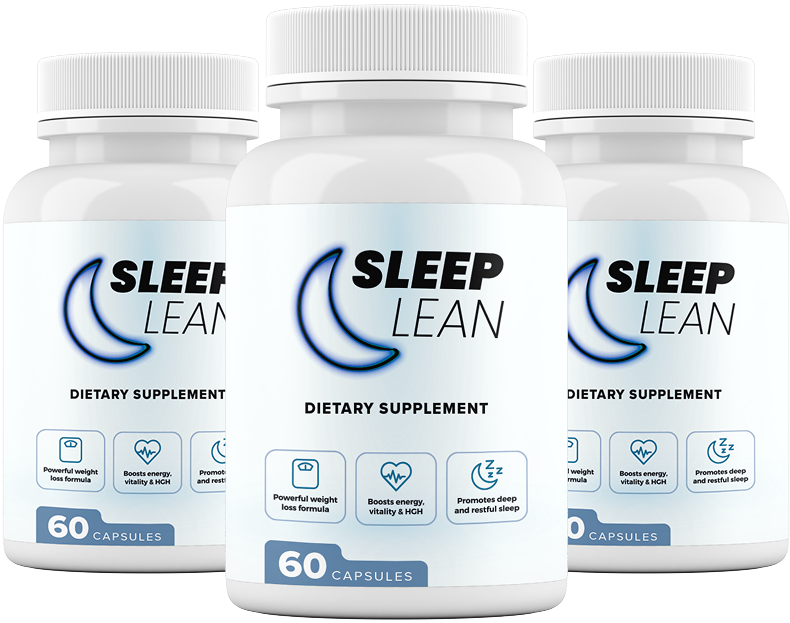

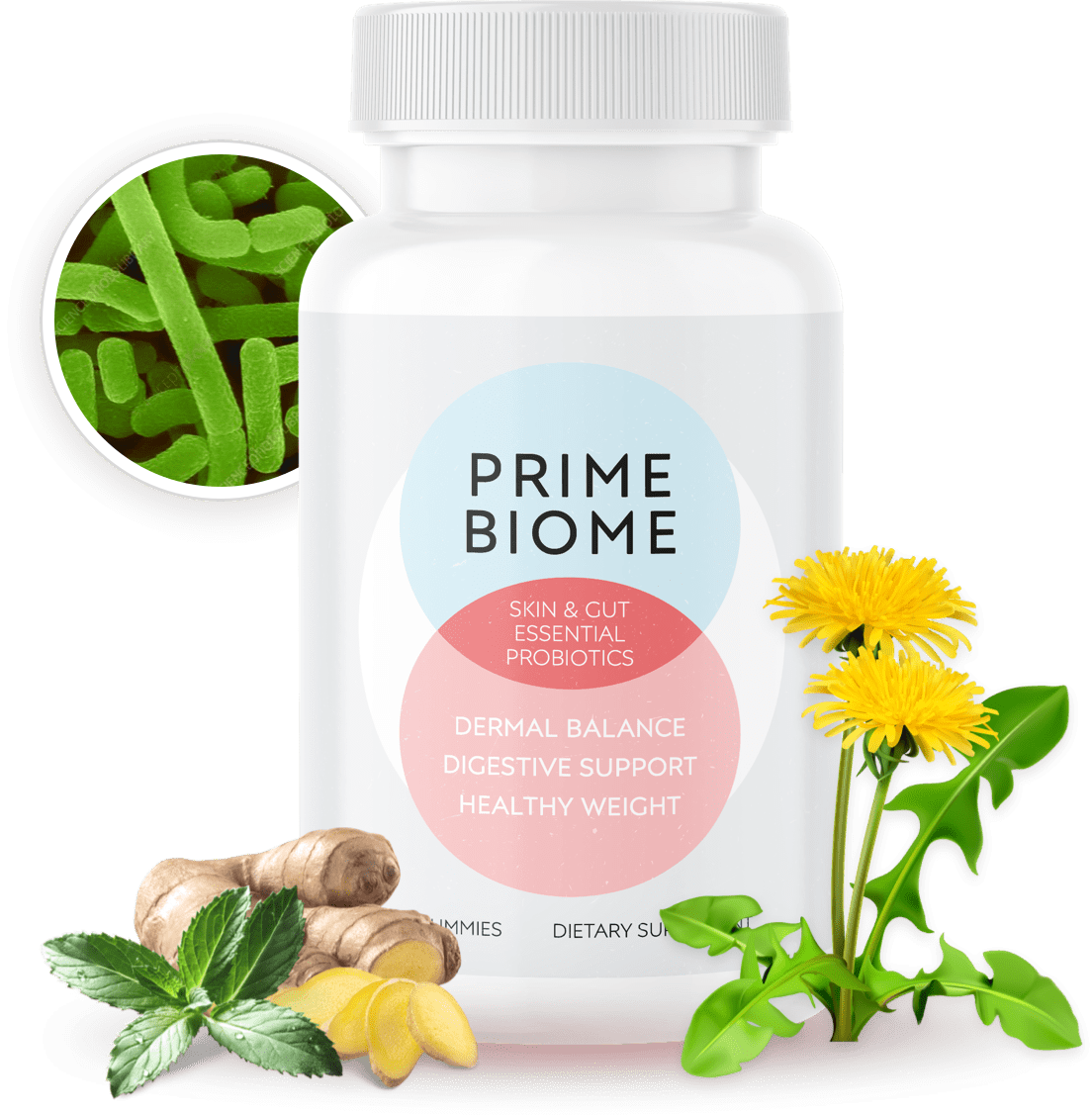


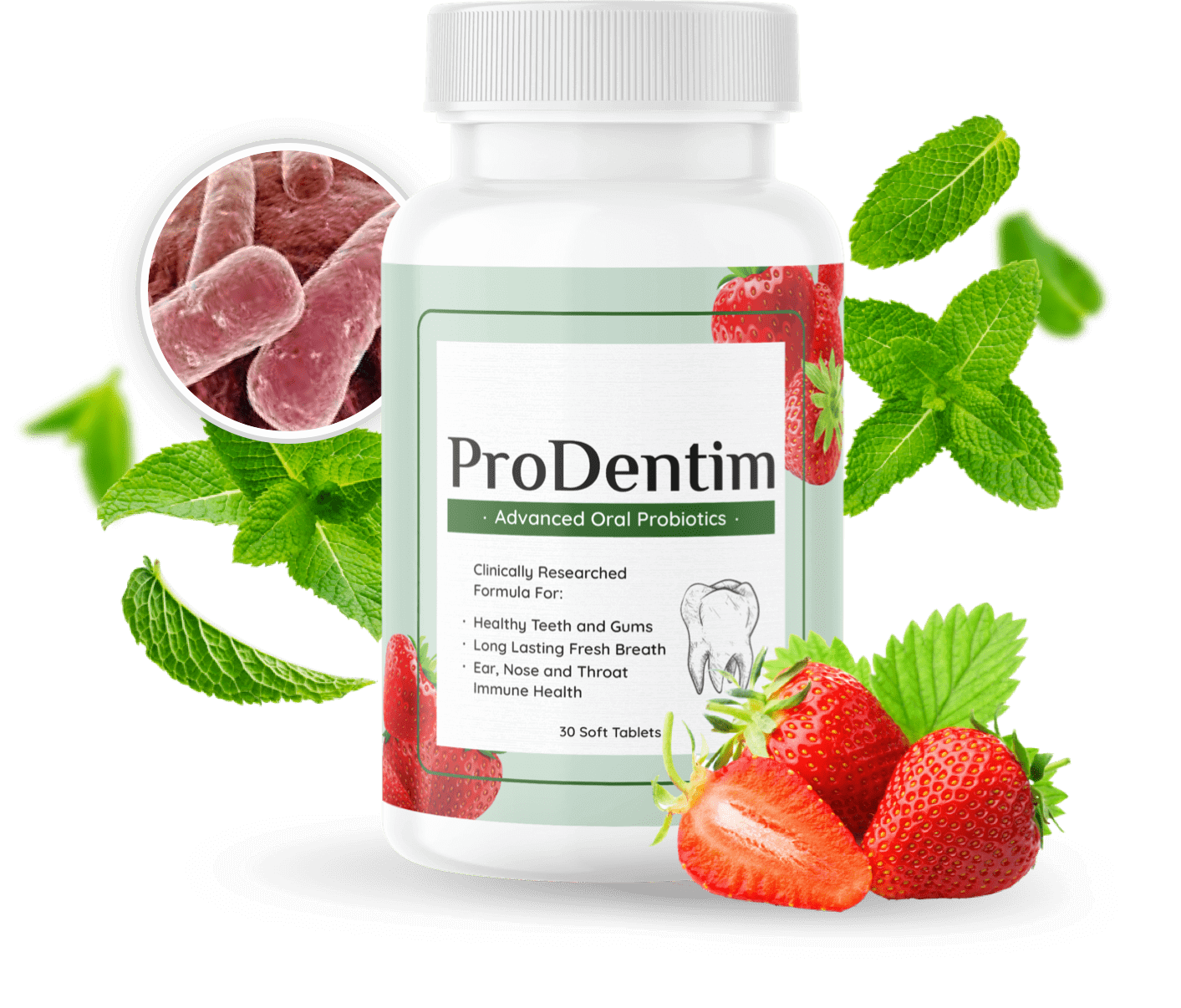

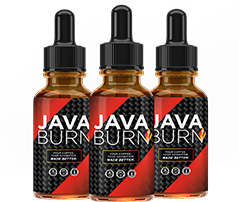

What do you think?
Show comments / Leave a comment